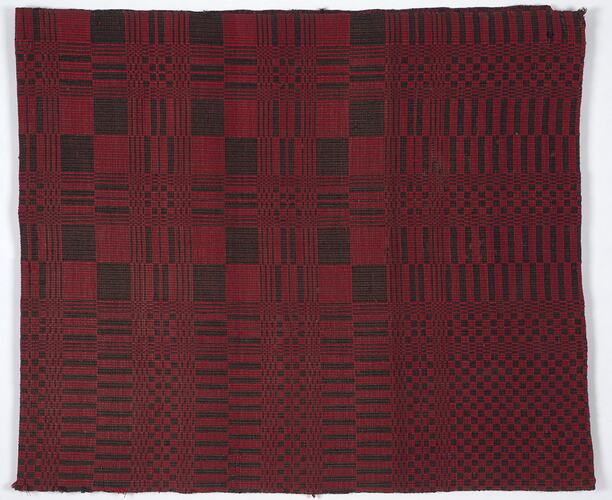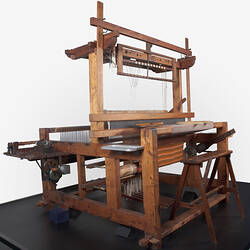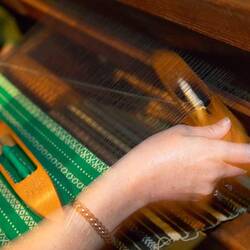Summary
Piece of woven fabric using traditional Latvian patterns from the Lielvarde Region. It was woven by Made Strauss, the mother of Anna Apinis, in Latvia circa 1930s. Anna Apinis was born in 1913 in Latvia. She attended weaving lessons in Liepaja in Latvia from 1930 to 1933 and spent hours at the nearby Liepaja Ethnographic Museum, recording traditional fabric designs in her notebooks. Anna had a loom constructed for her by fellow male survivors of World War II at Memmingen, a Displaced Persons camp in Germany. In 1950 Anna migrated to Australia, with her father Ernest, husband Ervins, their son Eriks, and her precious loom. She became one of the few suppliers of fabric for Latvian national costumes in Australia in the 1950s and 1960s, and exhibited her weaving nationally, at exhibitions and Latvian cultural festivals. She fulfilled her dream to keep her cultural traditions alive through her daughter Anita who continues to weave to this day.
Physical Description
Red, black and white striped fabric in tartan-like design. One side roughly finished and one end slightly frayed.
Significance
Significance: These items form part of the Apinis Latvian weaving collection, a collection of Latvian weavings, tools (including a countermarch floor loom), weaving notebooks, costume items and audio visual interviews. Its historical and cultural significance lies in the comprehensive documentation of the story through artefacts and narratives, the quality of the weavings and the rarity of particular items such as the loom created in a German displaced persons' camp after World War II and notebooks kept from the 1930s to preserve traditional Latvian weaving techniques. The collection documents the maintenance and transportation of cultural traditions.
More Information
-
Collection Names
-
Collecting Areas
-
Acquisition Information
Donation from Mrs Anita Apinis-Herman, Jun 2010
-
Past Owner
Mrs Anna Apinis, Sydney, New South Wales, Australia, circa 1960s
-
Other Association (See Comments)
-
Maker
-
Classification
-
Category
-
Discipline
-
Type of item
-
Overall Dimensions
1480 mm (Width), 1000 mm (Height)
-
Keywords
Clothing Accessories, Cultural Identity, Handcrafts, Latvian Communities, Latvian Immigration, Traditional Costumes, Weaving, Woolwork, Refugees, Displaced Persons, Displaced Persons Camps


